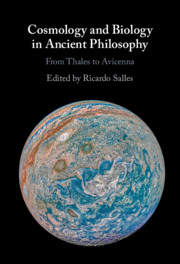Book contents
- Cosmology and Biology in Ancient Philosophy
- Cosmology and Biology in Ancient Philosophy
- Copyright page
- Contents
- Contributors
- Acknowledgements
- Introduction The Intersection of Biology and Cosmology in Ancient Philosophy
- Chapter 1 Souls and Cosmos before Plato
- Chapter 2 The Ensouled Cosmos in Plato’s Timaeus
- Chapter 3 Platonic ‘Desmology’ and the Body of the World Animal (Tim. 30c–34a)
- Chapter 4 The World Soul Takes Command
- Chapter 5 Begotten and Made
- Chapter 6 The De Motu Animalium on the Movement of the Heavens
- Chapter 7 Biology and Cosmology in Aristotle
- Chapter 8 Recapitulation Theory and Transcendental Morphology in Antiquity
- Chapter 9 The Stoics’ Empiricist Model of Divine Thought
- Chapter 10 Why Is the Cosmos Intelligent?
- Chapter 11 Cardiology and Cosmology in Post-Chrysippean Stoicism
- Chapter 12 The Agency of the World
- Chapter 13 God and the Material World
- Chapter 14 At the Intersection of Cosmology and Biology
- Chapter 15 Is the Heaven an Animal?
- References
- Index
- Index Locorum
Chapter 3 - Platonic ‘Desmology’ and the Body of the World Animal (Tim. 30c–34a)
Published online by Cambridge University Press: 21 May 2021
- Cosmology and Biology in Ancient Philosophy
- Cosmology and Biology in Ancient Philosophy
- Copyright page
- Contents
- Contributors
- Acknowledgements
- Introduction The Intersection of Biology and Cosmology in Ancient Philosophy
- Chapter 1 Souls and Cosmos before Plato
- Chapter 2 The Ensouled Cosmos in Plato’s Timaeus
- Chapter 3 Platonic ‘Desmology’ and the Body of the World Animal (Tim. 30c–34a)
- Chapter 4 The World Soul Takes Command
- Chapter 5 Begotten and Made
- Chapter 6 The De Motu Animalium on the Movement of the Heavens
- Chapter 7 Biology and Cosmology in Aristotle
- Chapter 8 Recapitulation Theory and Transcendental Morphology in Antiquity
- Chapter 9 The Stoics’ Empiricist Model of Divine Thought
- Chapter 10 Why Is the Cosmos Intelligent?
- Chapter 11 Cardiology and Cosmology in Post-Chrysippean Stoicism
- Chapter 12 The Agency of the World
- Chapter 13 God and the Material World
- Chapter 14 At the Intersection of Cosmology and Biology
- Chapter 15 Is the Heaven an Animal?
- References
- Index
- Index Locorum
Summary
The Platonic cosmogony and zoogony of the Timaeus is distinctive in that the actions of the Demiurge and the lesser gods are modelled on a wide variety of skills, some obeying mathematical principles, some being modelled on more empirical crafts. Focused on Tim. 30c-34a, this chapter examines the reasons provided by Timaeus to account for some key properties attributed to the body of the World Animal (uniqueness, completeness, composition out of four elements, sphericity) and considers in detail Timaeus’ arguments to account for the actual composition of the World Body out of four elements unified by the mathematical bond of analogia. It is suggested that these arguments belong to a broader Platonic reflection on how to bind multiple parts into unified and coherent wholes. This broader Platonic reflection is here labelled ‘desmology’, a word coined on the Greek noun desmos (bond) frequently used in the Timaeus to refer to cosmogonical and zoogonical processes. This chapter also argues that making sense of how Plato uses desmos and other cognate terms in the Timaeus is key to understanding to what extent the cosmo-zoogony of the Timaeus as a whole actually fulfills Socrates’ strong teleological requirement for natural science expressed in the Phaedo (99b-c), as he criticizes earlier Presocratic accounts.
- Type
- Chapter
- Information
- Cosmology and Biology in Ancient PhilosophyFrom Thales to Avicenna, pp. 46 - 71Publisher: Cambridge University PressPrint publication year: 2021
- 2
- Cited by



